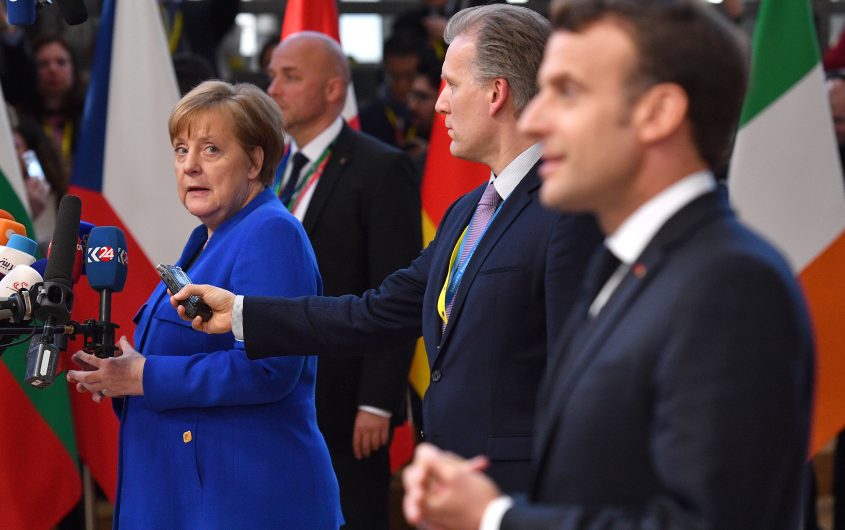
Germany: Hegemon or Free Rider?

Stephen F. Szabo
Senior Fellow
Dr. Stephen F. Szabo is a Senior Fellow at AICGS, where he focuses on German foreign and security policies and the new German role in Europe and beyond. Until June 1, he was the Executive Director of the Transatlantic Academy, a Washington, DC, based forum for research and dialogue between scholars, policy experts, and authors from both sides of the Atlantic. Prior to joining the German Marshall Fund in 2007, Dr. Szabo was Interim Dean and Associate Dean for Academic Affairs and taught European Studies at The Paul H. Nitze School of Advanced International Studies, Johns Hopkins University. He served as Professor of National Security Affairs at the National War College, National Defense University (1982-1990). He received his PhD in Political Science from Georgetown University and has been a fellow with the Alexander von Humboldt Stiftung, the Woodrow Wilson International Center for Scholars, and the American Academy in Berlin, as well as serving as Research Director at AICGS. In addition to SAIS, he has taught at the Hertie School of Governance, Georgetown University, George Washington University, and the University of Virginia. He has published widely on European and German politics and foreign policies, including. The Successor Generation: International Perspectives of Postwar Europeans, The Diplomacy of German Unification, Parting Ways: The Crisis in the German-American Relationship, and Germany, Russia and the Rise of Geo-Economics.
Germany has been the most pro-European of all the big players within the EU. Europe’s largest country in terms of population and economic weight, Germany has always been reluctant to lead and to reopen the German question regarding its domination. Today, however, the EU is under a major assault from without and within. Robert Kagan wrote recently of “The New German Question: What Happens When Europe Comes Apart,” arguing that the rapid changes in Germany’s strategic position reopen the prospect of a new German nationalism.
As Kagan and others have pointed out, Germany and Europe have benefitted from seven decades of American commitment to Europe and to the liberal world order. Given Trump’s open attacks on both Germany and the European Union, the need for a new hegemon is crucial to maintain the European Project. Germany is the only serious candidate for that role. However, as Simon Bulmer and William Paterson point out in their new book, Germany and the European Union: Europe’s Reluctant Hegemon (London: Red Globe Press, 2018), prospects for German leadership, let alone hegemony, are not good. The authors—both respected academic analysts of German foreign policy and its role in Europe—provide a timely and indispensable contribution to the literature and to the beginning of an assessment of where Germany is headed in its most important policy area, Europe. Their purpose in this wide-ranging survey is to determine whether Germany is in fact a reluctant hegemon, as a leader or a dominator, and how German domestic politics inhibit or facilitate German hegemony.
Hegemony requires not only power resources, but a sense of legitimacy based on the consent of its followers.
Given hegemonic stability theory, the EU needs a hegemon willing to act “as the guarantor of a set of benefits (‘collective goods’) to the EU.” This role, which was played by the United States for decades, is now in need of a new benign hegemon and only Germany seems to have the requisite power to fill it. As they point out, hegemony requires not only power resources, but a sense of legitimacy based on the consent of its followers. This consent must come both from the other member states of the EU and from the German public. In short, does EU governance allow for a hegemon and do German politics inhibit or facilitate this role? How can Germany exercise power without reopening the old German strategic dilemma of being seen as dominant and domineering, without creating counter-balancing coalitions or, conversely, without being too hesitant and inward-looking thereby creating a vacuum within Europe?
Bulmer and Paterson provide an extensive review of the factors and trends shaping Germany’s role in Europe. They conclude that Germany’s power resources are based largely on its structural economic strength and on a set of ideas on economic policy that can be broadly summarized as Ordoliberalism. However, Germany has serious deficiencies in the areas of military power and strategic purpose. It has acted as a hegemon primarily in the economic policy areas, and most importantly in the Eurozone crisis. Here the combination of power resources, ideas, and domestic politics saw Berlin shape the outcome of the Greek crisis and the management of the Eurozone.
In contrast, it has not been a leader in the broad area of European security following the paradigm of a Civilian Power. Within the EU, Germany has long followed a policy of “cooperative hegemony” through its partnership with France. This has allowed German economic power to be balanced by French military and strategic power and eased concerns about German domination. Germany’s lack of complete sovereignty during the Cold War also kept it a tamed Power. After German unification, the Franco-German engine was weakened due to divergent trajectories in the two economies. French economic decline occurred while German economic power soared and Berlin regained full sovereignty. This has undermined the balance that supported this critical partnership and, with the impending exit of the UK from the EU, has left no alternative to replace it.
During the Ukraine crisis Germany’s response to Russian aggression was to rely on the economic instruments of sanctions while acting as “supreme facilitator rather than hegemon.” However, this demonstrated the limits of the German approach as Berlin could not resolve the crisis, just contain it. As the authors put it, “Putin has refused to be ‘facilitated.’” It is one thing to lead within a rule-based system like the EU where you are the largest economy; it is something else to deal with other major powers in a system where military power plays a role.
The addition of seventeen million East Germans with no experience with the European project, combined with the political reaction to both the Eurozone and refugee crises, has resulted in a more national interest-based and less integrationist policy.
German domestic politics has also become less supportive of European integration since German unification. The addition of seventeen million East Germans with no experience with the European project, combined with the political reaction to both the Eurozone and refugee crises, has resulted in a more national interest-based and less integrationist policy. The public has also not been supportive of a larger role in the security arena resulting in Germany being a taker rather than a maker of security and developing a reflex of “leadership avoidance.”
In short, there is little public support for a hegemonic role and diminishing support within the fragmenting party system for more than a leadership which protects German interests with little room for the protection of weaker states. The Eurozone and refugee crises combined with the rise of euroskepticism in the broader public has broken what they describe as a “virtuous circle of permissive consensus” on the EU. This has resulted in a shift from an integrationist and federalist community method to a more pragmatic intergovernmental union method favored during the Merkel years.
The authors conclude with a paraphrase from de Gaulle, “Germany is a future hegemon and always will be.” What this all means for Europe is that the prospect of a European renaissance along the lines advocated by President Emmanuel Macron is unlikely and that Europeans will be engaged in a prolonged period of damage limitation rather than grand projects. Or, to paraphrase Helmut Schmidt, if you are looking for vision consult an eye doctor but don’t expect to find it in Berlin.








